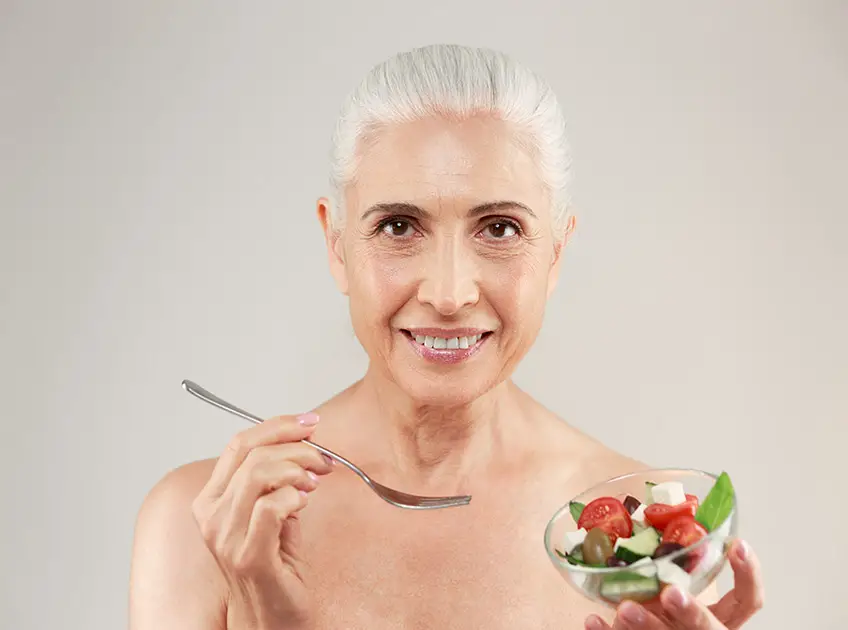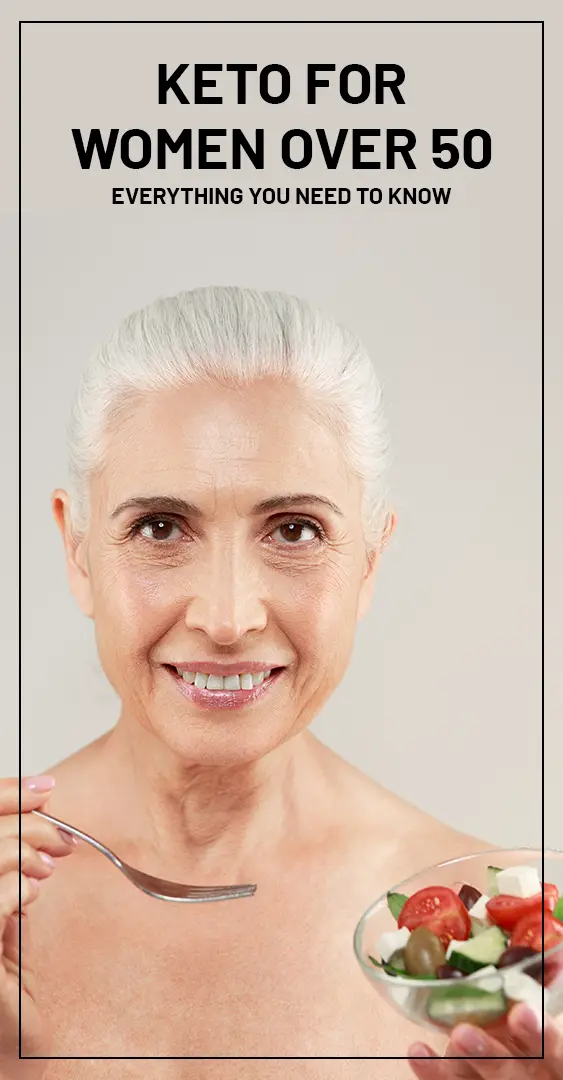
Important: This article is for informational purposes only. Please read our full disclaimer for more details.
People often switch to special diets and exercise routines to get rid of excessive body fat. Although it’s good to eat healthily and indulge in physical activities, losing weight takes time, patience, and extra effort.
The Keto diet has gained huge popularity in the recent past for good reasons. It is helping people reduce weight. However, once you cross 50, losing weight becomes more challenging as the rate of metabolism slows down.
Still, many ways can help you lose extra pounds, and one of them is the keto diet. Let’s explore keto for women over 50 and how to use it effectively for weight loss.
What Is A Keto Diet?
Keto diet is a low-carb, high-fat, and moderate protein diet. This diet focuses on reducing carbohydrate intake and increasing fat consumption. It assists the body in burning fat in its stores.
Keto diet proves not only beneficial for losing weight but for overall health. Since it allows consuming fat, you feel fuller most of the time and don’t crave certain foods that may increase your body weight.
How Does The Keto Diet Help?
The soul of a keto diet is ketones.
When you reduce carb intake, the body lacks blood sugar and uses ketones from fat as an alternate energy source. When the body uses fats as an energy source, it is called ketosis. This ultimately burns body fat which helps you get in shape.
Here, it is important to know that ketone production happens only when you take the right amount of protein.
A keto diet should contain about 5% carbohydrates, 25 % protein, and 75% fats. Once you start a keto diet, a urine test can help you know whether the body is in ketosis or not.
What Food Should You Include In Keto For Women Over 50?
Since the keto diet emphasizes more fats and proteins than carbohydrates, here is the list of foods that you can include in your diet-
1. Vegetables– If you are a vegetarian, you must include plenty of green and leafy vegetables in your diet as they are a good source of protein.
Besides, you need to have vegetables that lack starch. At the same time, using foods with healthy fats like coconut, olive, avocado, or macadamia nut oils is useful for fat consumption.
2. Eggs– Being a rich source of protein, eggs will furnish the need for a keto diet. You can have them boiled, fried, or scrambled- whatever way you like the most.
3. Meat– For non-vegetarians, meat is a great source of protein and healthy fat. Make sure you take only unprocessed meat with no or little added carbs.
4. Fish and Seafood– Fish and seafood are other sources of protein and omega-3 fatty acids. These compounds are essential for replenishing the protein in the body. Avoid farm fish because the risk of bacterial contamination and antibiotics making it into the food chain is very high.
5. Dairy Products– Consume high-fat dairy products as they have little added sugar.
What Food Should You Avoid While On The Keto Diet?
As already explained, the keto diet should not have many carbohydrates; therefore, you should limit the intake of the following-
- Alcohol
- Added sugars
- Processed food
- Fruit with high sugar, like mangoes, grapes, and berries.
- Starchy food like wheat, rice, white bread, and potatoes.
How Effective Is Keto For Women Over 50?
A ketogenic diet is a good strategy for losing weight, epically among older women. It is because of the following reasons-
- Keto diet improves insulin sensitivity, which can help improve fuel utilization and metabolism.
- Protein and fat intake increases in a keto diet that makes you feel full. It supports the hunger hormones like leptin and ghrelin and thus works as an appetite suppressant.
- Studies revealed that the keto diet reduces lipogenesis- the process of converting sugar into fat. The excess carbs stored as fat are utilized for energy production.
- Many research claims that the keto diet increases fat-burning while you rest, perform daily activities, and exercise.
With all these benefits, a keto diet seems highly effective for older people whose slow metabolism is not allowing them to lose weight fast.
However, you should be aware of a few side effects of the keto diet.
Side Effects Of The Ketogenic Diet
Once you start your keto diet and modify your eating habits, the body may come into shock and experience sudden changes. People may have a few side effects that eventually subside over time. They are-
- Keto flu– It is also called carb flu and is a short-term response to dietary changes. Usually, the symptoms are similar to common flu.
- General weakness, nausea, and dizziness
- Diarrhea and vomiting
While these responses result from dietary changes, the body takes time to adjust, and they resolve within a week.
Tips To Get The Best Out Of A Keto Diet-
1. Don’t forget your protein– Intake of the right amount of protein is essential for successful weight loss through the keto diet. Protein boosts metabolism and regulates hunger hormones.
2. Consume the right amount of fats- When cutting carbs, you need to consume fat to get energy. Make sure you are eating healthy fats in the right proportion.
3. Cut alcohol– Alcohol is one of the culprits behind extra fat in your body. As you over-drink, the body stops the metabolism of other substances as it wants to get rid of a toxic byproduct of alcohol called acetate first. So, excessive alcohol consumption could be counterproductive when you are on a keto diet.
4.Cut back on carbs– Let the carbohydrate-rich diet creeps back when you are on a keto diet. Stop consuming starchy food, sugar, and processed food.
Final Words
Keto diet for mature women is effective as their rate of metabolism slows down after certain age. When followed properly and rigorously, a ketogenic diet will work wonders in helping older women in shape.
Note: If you are on medications, consult your doctor before starting any special diet.
Recommended Topics:
- 10 Best Keto Meal Subscription Boxes
- Top 10 Keto Influencers On Instagram
- Low Carb Keto Strawberry Shake – Health Benefits & Recipe
- Chia Seeds Water for Weight Loss – Benefits, Recipes and How to Drink
- How To Take Milk Thistle For Weight Loss
- 1200 Calorie Diet Plan For Weight Loss: What is it & Menu Plan
- The 3 Day Diet Plan for Weight Loss
















